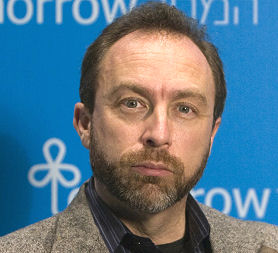Jimmy Wales – Wikipedia, the interview
The founder of Wikipedia, Jimmy Wales, speaks to Jon Snow about accuracy, homework and conifer trees.
This weekend sees the 10th anniversary of the website, Wikipedia. The online open sourced encyclopaedia has become an internet phenomena, famous for allowing anyone to contribute to and edit its entries.
However the scale of the site’s success has also been blamed by some for affecting academic studies as students seek their answers online.
Co-founder Jimmy Wales was interviewed by Jon Snow who asked him if Wikipedia had just replaced homework, as students were just copy and pasting from the site?
“Yeah but the thing is your teachers also have Wikipedia and they will find out and you’ll get an F on your grade so we don’t think that’s a huge problem, ” replied Wales.
“What we do find is that young people are incredible passionate about Wikipedia. When I speak to a high school or a college, they’re out of their minds for it.”
However the ease with which people can publish entries has also lead to concerns about accuracy of the content on the site.
“When we’ve had academic studies comparing Wikipedia to traditional encyclopaedias we’ve come out very well. We haven’t seen enough research done into that.”

Citing his own entry Jon Snow pointed out that he has been described as an avid lover of conifer trees, and a patron of the British Conifer Society of which he is neither. (He is however a patron of Trees for Cities). That mistake has been published on Wikipedia since May 2009.
“This is the kind of thing that can persist for quite some time, because it isn’t particularly outrageous.” Wales then went on to describe how his own entry incorrectly described him as a chess player.
Wikipedia users will be familiar with Wales’ face as he has been pictured across the top of the site in recent months in an effort to raise funds for the site. The campaign has successfully reach its $16m funding target in under 50 days, allowing them to continue to expand and test out new ideas.
“One of the things that we’re testing right now is what we call “flagged revisions”. It’s basically a system where for biographies and other high risk entries, things will be reviewed by a trusted member of the community before they go live if it’s inputted by somebody that we don’t know. “
Wikleaks has been greatly in the news of late and there has been much confusion between the two sites who share a similar name. (Wiki-wiki means “Hurry quick” in Hawaiian.)
However Wales is clear that they have “Nothing to do with Wikileaks and in fact they’re not a wiki.”
“It’s not a collaborating editing model. With Wikileaks what they’re doing is they get information, they leak it. There’s not really a collaborative editing filtering process going on. “
So what does the future hold for Wikipedia?
“What we need to do is to ask people be very critical of all your information sources. Think about it very hard. And keep in mind that Wikipedia is an open system so things can go wrong but there is a core community there who are very, very passionate about getting it right.
“What we need to think about is how do we empower people like that, the people who really care about getting it right.”
-
Latest news
-
Laughing Boy: New play tells the tragic tale of Connor Sparrowhawk5m

-
Sewage warning system allows some of worst test results to be left off rating system, analysis shows3m

-
Post Office inquiry: Former CEO didn’t like word “bugs” to refer to faulty IT system4m

-
Israeli soldier speaks out on war in Gaza12m

-
PM’s defence spending boost should be ‘celebrated’, says former Armed Forces Minister4m

-




